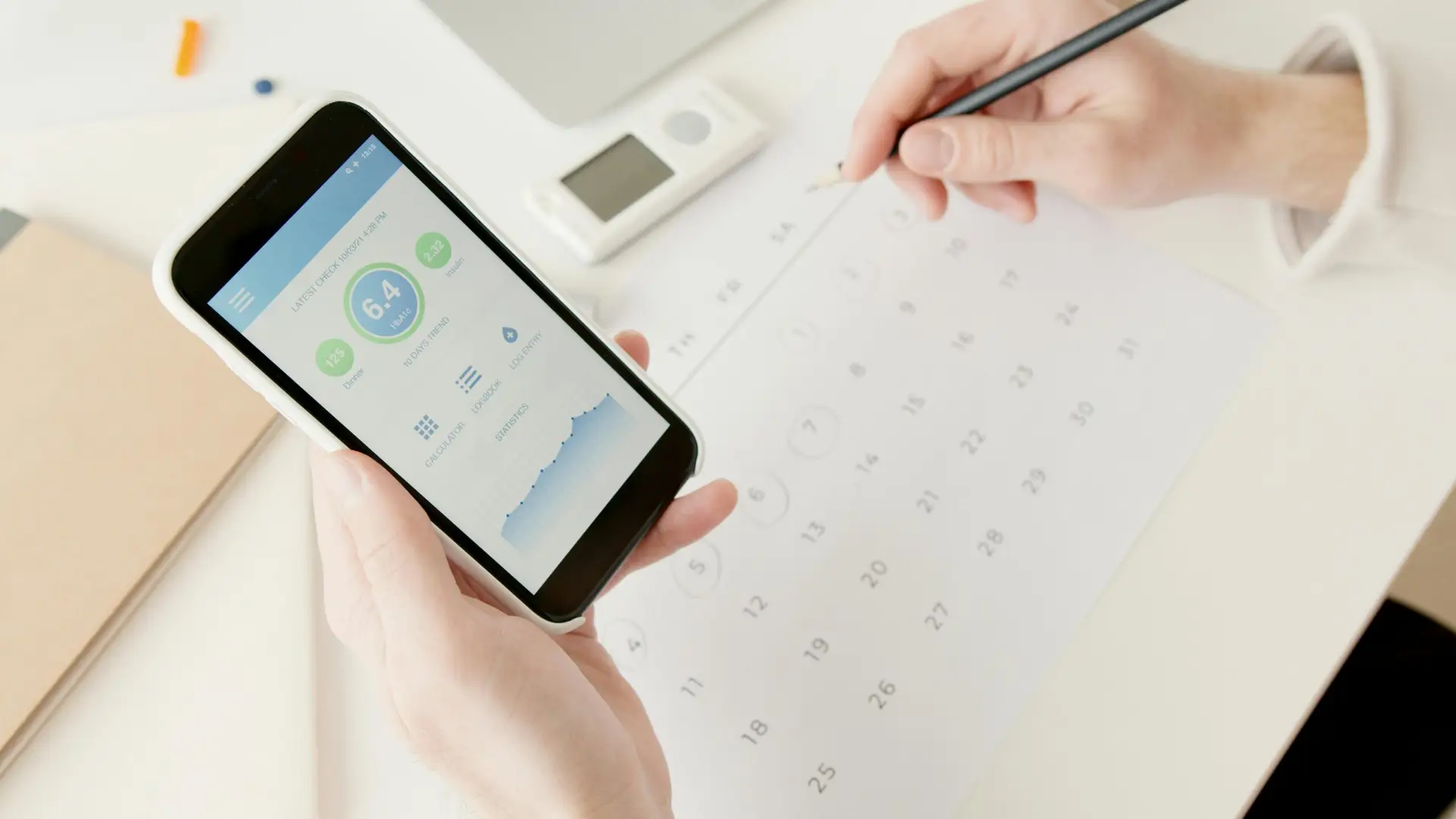Did you know that people who use weight loss apps lose up to 3 times more weight than those who don’t? It’s true!
In this digital age, your smartphone can be your secret weapon for shedding those stubborn pounds.
We’ve put our heads together and sweated through countless app trials to bring you the cream of the crop.
Get ready to transform your body and crush your goals with these game-changing weight loss apps!
Why Use a Weight Loss App?
The Power of Tracking and Accountability
One of the greatest benefits of using a weight loss app is the ability to track your progress in real-time.
Studies show that people who monitor their calorie intake, physical activity, and other health metrics tend to lose more weight and maintain it long-term.
Having your data at your fingertips allows you to be accountable for your choices, making it easier to stay on track even when life gets hectic.
Whether it’s counting calories, tracking your workouts, or monitoring your water intake, a weight loss app acts as a constant reminder of your goals.
Personalized Guidance at Your Fingertips
No two weight loss journeys are the same, and that’s where personalized guidance comes in.
Many apps tailor their recommendations based on your body type, goals, and lifestyle, giving you actionable tips that are designed specifically for you.
This customization can include everything from personalized workout plans to diet recommendations based on your eating habits.
With AI-powered diet recommendations and nutrition monitoring, these apps help ensure you’re making informed decisions that fit your unique needs.
Community Support and Motivation
Staying motivated on a weight loss journey can be tough, but having a community behind you makes a big difference.
Many weight loss apps offer features like community challenges, forums, and social sharing, where you can connect with others on a similar journey.
Whether it’s receiving encouragement or friendly competition, this added layer of support can help you stay committed to your goals.
Plus, sharing your milestones with others brings an extra sense of accomplishment.
Integration with Other Health and Fitness Tools
The best weight loss apps don’t work in isolation—they integrate with other tools and devices like fitness trackers, wearable devices, and even sleep monitors.
This creates a seamless experience where all aspects of your health, from your steps to your sleep patterns, are captured in one place.
When your weight loss app syncs with tools like step counters or sleep quality trackers, you can get a more holistic view of your health, helping you make better decisions about your fitness and nutrition.
Top Features to Look for in a Weight Loss App.
Calorie and Macronutrient Tracking
A key feature in any effective weight loss app is the ability to track calories and macronutrients (proteins, fats, and carbs).
Knowing exactly how much you’re consuming allows you to stay within your caloric goals while ensuring that you’re getting the right nutrients to fuel your body.
Some apps even offer meal planning and nutrition monitoring software to take the guesswork out of eating.
Exercise Logging and Workout Plans

Another essential feature is exercise tracking.
Whether you’re logging your workouts manually or following built-in fitness plans, keeping track of your physical activity helps you balance calorie intake with calorie burn.
Some apps also come with workout video libraries or personalized fitness progress trackers that guide you through various exercises, from cardio to strength training.
Water Intake Monitoring
Staying hydrated is crucial for weight loss and overall health.
Many weight loss apps include a water intake monitor to help you track how much water you’re drinking throughout the day.
By setting hydration goals and tracking your progress, you can avoid dehydration and improve your metabolism, which is key for burning calories efficiently.
Progress Photos and Measurements
Weight loss isn’t just about numbers on a scale.
Apps that allow you to take progress photos or track body measurements give you a better sense of your journey.
Seeing visual changes in your body over time can be a huge motivator and offer insight into your progress, even when the scale isn’t moving as quickly as you’d like.
Tools like a body measurement tracker or before-and-after photo tool can highlight changes that a scale might not capture.
Barcode Scanner for Easy Food Logging
To make tracking your food even easier, many weight loss apps now include barcode scanners.
Instead of manually entering each item you eat, you can simply scan the barcode of packaged foods, and the app will automatically log the nutritional information.
This feature saves time and ensures accuracy when tracking your meals, which is especially helpful when you’re trying to stay within specific calorie or macro limits.
Our Top 15 Weight Loss Apps for 2024.
1. MyFitnessPal
MyFitnessPal has long been a go-to app for anyone looking to track their weight loss journey, and for good reason.
With a massive food database of over 11 million items, it’s easy to log your meals and see exactly how many calories and nutrients you’re consuming.
Its social features allow you to connect with friends and join challenges, making it great for accountability.
Syncing with fitness devices like FitBit and Apple Watch makes it easy to monitor both your nutrition and physical activity all in one place.
2. Noom
Noom takes a different approach to weight loss by focusing on the psychological aspects of dieting.
Its psychology-based approach helps you identify and overcome unhealthy habits through cognitive behavioral therapy (CBT) techniques.
With personal coaching available via the app, you get one-on-one support tailored to your specific goals.
Noom’s daily lessons and quizzes make learning about nutrition and behavior change fun and interactive, helping users to create long-lasting habits.
3. LoseIt!
– LoseIt! offers a user-friendly interface that makes tracking your food and exercise quick and simple.
One of the app’s standout features is Snap It, which allows you to log meals by simply taking a photo, making food logging faster and more visual.
In addition, LoseIt! offers a vibrant community where users can join challenges and connect with others for support.
Whether you’re a beginner or a seasoned tracker, LoseIt! offers easy-to-follow tools for hitting your weight loss goals.
4. WW (formerly Weight Watchers)
WW, or Weight Watchers, has rebranded its approach to weight loss, offering both in-person and digital options to suit different lifestyles.
The app uses a points-based system, making it easy to track what you eat without getting bogged down by calorie counting.
WW’s recipe database and meal planning tools help you stay on track with nutritious meals that fit within your daily points.
Plus, the flexibility to attend meetings in person or follow the program digitally provides support no matter where you are in your journey.
5. FatSecret
FatSecret is a top choice for users who want a clean, ad-free interface that’s both simple and effective.
The app offers detailed nutritional information on all your meals, making it a great tool for those focused on tracking macronutrients as well as calories.
FatSecret also provides professional health support, allowing you to share your food diary with a dietitian, trainer, or doctor for expert guidance on your progress.
6. Fitbit
Fitbit’s app is the perfect companion for anyone using a Fitbit device.
It offers seamless integration, allowing you to monitor steps, heart rate, and even detailed sleep patterns.
This app goes beyond basic weight loss tools, offering sleep tracking to help you understand how rest impacts your weight management efforts.
Plus, with guided breathing sessions designed to reduce stress, Fitbit ensures that you’re working towards holistic health and wellness.
7. MyPlate by Livestrong
MyPlate by Livestrong provides a well-rounded approach to weight loss with its visual representation of food groups that helps users easily see their daily intake.
It features daily motivational quotes to keep you inspired throughout your journey.
Its customizable dashboard allows you to tailor the app to your unique goals, helping you focus on what matters most to you, whether it’s weight loss, fitness, or general wellness.
8. SparkPeople
SparkPeople is known for its vast array of resources, making it a great option for users who enjoy variety.
With an extensive library of workout videos, you can follow along with exercises tailored to your fitness level.
The app also offers detailed meal plans and recipes to help you stay on track with your nutrition.
The active community forums provide a place for users to exchange tips, share successes, and find support on their weight loss journey.
9. Cronometer
Cronometer is the app for those who love data.
It tracks up to 82 micronutrients, giving users insight into their vitamin and mineral intake, which most weight loss apps don’t provide.
This app delivers data-driven insights to help you understand exactly what you’re eating and how it impacts your body.
Whether you follow a keto, vegan, or any other diet, Cronometer supports various diet types, allowing for a highly personalized approach.
10. Fooducate
Fooducate stands out for its ability to grade your food choices from A to D, helping you make smarter, healthier decisions in real time.
It also suggests healthier alternatives, guiding you toward better options while you shop or plan your meals.
In addition to tracking diet, Fooducate allows users to track sleep and mood, offering a more comprehensive view of how these factors affect weight loss and overall health.
11. Happy Scale
Happy Scale takes a refreshing approach to weight loss by breaking down your goals into manageable milestones, making the journey less overwhelming.
Instead of focusing solely on big-picture goals, it helps you celebrate small victories along the way.
The app predicts your future weight based on past trends, allowing you to see the long-term results of your efforts.
One standout feature is its ability to smooth out daily weight fluctuations, so you’re not discouraged by short-term changes.
12. Zero
Zero is the go-to app for those who follow or are curious about intermittent fasting.
It offers various fasting protocols like 16:8, 5:2, and more, making it adaptable to different lifestyles.
With a fasting timer and built-in reminders, you’ll always know when to start and stop eating, keeping you on track with your fasting goals.
Zero also provides insights into how fasting can positively affect your metabolism and overall health.
13. Lifesum
Lifesum is a versatile app that tailors personalized diet plans to your specific goals, whether you’re aiming for Clean Eating, Keto, or High Protein.
It simplifies your meal planning by generating weekly shopping lists, making it easier to stick to your dietary goals.
Lifesum also integrates with popular health apps and wearables, so all your data stays in one place, giving you a comprehensive view of your progress.
14. Yazio
Yazio is perfect for users who want a no-nonsense, intuitive food diary that emphasizes tracking macronutrients as well as calories.
The app also includes a body fat percentage calculator, which is a great tool for those focusing on more than just the number on the scale.
With customizable fitness plans, Yazio allows you to tailor your workouts to your specific goals, whether it’s losing weight, building muscle, or maintaining a balanced lifestyle.
15. Rise
Rise offers a unique, personalized approach by pairing users with real nutrition coaches.
You simply log your meals by snapping a picture, and your coach provides feedback on what you’re doing well and what could be improved.
The daily photo-based meal logging makes tracking your food less time-consuming, while the feedback from nutritionists ensures that you’re following a plan that’s tailored to your individual needs.
This hands-on approach helps keep you accountable and adjusts your plan as you progress.
Remember, folks, the best app is the one you’ll stick with.
Don’t be afraid to try a few before settling on your perfect match. Your weight loss journey is personal, and so should be your choice of app.
Now, let’s get tracking and start crushing those goals!
How to Choose the Right Weight Loss App for You
Consider Your Personal Goals and Preferences
When selecting a weight loss app, the first step is to align it with your specific goals.
Are you focused on calorie tracking, intermittent fasting, or improving your workout routine?
Some apps excel in certain areas, like MyFitnessPal for comprehensive food logging or Zero for fasting.
Be clear about whether your priority is nutrition, exercise, or mindfulness.
Look at User Reviews and Ratings
User reviews and app ratings provide invaluable insight into real-world experiences.
Look for reviews that discuss ease of use, effectiveness, and any potential drawbacks.
Pay special attention to apps that have consistently high ratings and positive feedback related to the features you need most, such as community support, device integration, or meal planning tools.
Try Free Trials Before Committing
Many premium apps offer free trials or basic versions before requiring a paid subscription.
This trial period is essential for exploring whether the app is a good fit for your needs.
Use the time to check whether the app’s functionality aligns with your expectations.
For example, see if the app’s barcode scanner works well or if the habit formation tracker truly helps reinforce new behaviors.
Assess Compatibility with Your Devices and Other Apps
Before making a commitment, ensure the app is compatible with your devices and integrates smoothly with any wearable technology or other fitness apps you use.
Apps like Fitbit and Lifesum are known for their seamless integration with a range of wearables and health tracking tools.
Cross-platform syncing is a valuable feature if you plan to use the app across multiple devices (e.g., your phone and smartwatch).
Tips for Success with Weight Loss Apps
Be Consistent with Logging
One of the biggest keys to success with weight loss apps is consistency.
Whether you’re tracking your meals, workouts, or sleep, ensure that you log your data regularly.
Frequent and accurate logging helps you identify patterns and progress over time.
Many apps, like LoseIt! or MyPlate, offer easy-to-use interfaces to make daily logging a quick part of your routine.
Set Realistic Goals
It’s important to set achievable, realistic goals within your weight loss app.
Whether it’s losing a pound a week or adding more protein to your diet, your app can guide you through the process of breaking these down into manageable steps.
Apps like Happy Scale help you visualize how small milestones lead to long-term results, making your journey less overwhelming and more encouraging.
Utilize Reminders and Notifications
Weight loss apps often come equipped with reminders and notifications to help keep you on track.
Make sure to enable these features, as they can prompt you to log meals, drink water, or complete a workout.
For example, Zero offers reminders for when to start and stop fasting, while Noom sends daily lessons that encourage mindfulness.
Engage with the Community Features
Many weight loss apps, such as WW and SparkPeople, offer robust community support features.
Engaging with these communities can help you stay motivated, share experiences, and find encouragement during setbacks.
Accountability through social interaction has been shown to enhance long-term success, so don’t hesitate to join challenges, comment in forums, or reach out for advice.
Regularly Update Your Information for Accurate Tracking
As you progress in your weight loss journey, make sure to update your app with new information.
This could include changes in your weight, activity level, or even dietary preferences.
Keeping your data up to date ensures that the app continues to provide accurate insights and personalized recommendations.
Apps like Cronometer and Lifesum are especially great at providing tailored advice based on real-time updates.
Alright, fitness warriors, it’s time to level up your weight loss game!
These 15 apps are your ticket to a healthier, happier you.
Remember, the best app is the one you’ll actually use.
So pick your favorite, download it, and start crushing those goals.
Your future self will thank you. Now, who’s ready to make 2024 their fittest year yet?!



